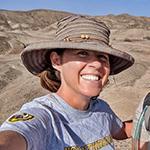
Amy L Rector, Ph.D.
Amy has been working at paleoanthropological sites across Africa for more than 20 years: searching for fossils of our ancestors and the other animals who shared the landscape with them, reconstructing what ancient habitats looked like, and learning about modern habitats in the same areas today. She wants to tell the stories of what the world was like for our ancestors, and how it has changed over time to today.
Why are you interested in your research focus?
As a kid, I wanted to study things that were old—and at first, I thought I wanted to be an archaeologist in my home state of Virginia. As I learned more about the field of anthropology and the deep history of our species, I shifted my focus to our earliest ancestors and their paleoenvironments.
As a paleoecologist, I want to know what our ancestors saw when they first opened their eyes in the morning. What kinds of noises did they hear at night? Which animals were in their community that might have eaten them, and what animals were they competing with for food? How was their world different compared to what we see in the same places today? With this information, we can reconstruct habitats, lifeways, and evolutionary histories of our ancestors.
A great moment in the field
I was at the site where Lucy was found—Hadar, Ethiopia—for the first time, learning about survey, excavation, and field traditions. In one Hadar tradition, the team honks the horn of the Land Cruiser as they are coming back into camp at the end of the day if they’ve discovered a fossil of one of our ancestors. My team found a piece of foot bone from Lucy’s species, and I was driving the vehicle back to camp. I was shy about honking the horn, so just gave a little “hoot hoot.” My colleague said to me, “no, Amy, HONK THE HORN,” so I laid on the horn until all the members of camp poured out of the tents to meet us as we drove in. They were excited about our foot bone, but thought that we had found a whole skeleton based on the way I honked the horn!
Education
- 2010—Ph.D. Arizona State University (Biological Anthropology)
